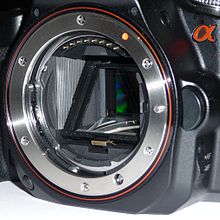Single-lens translucent (SLT) is a Sony proprietary designation for Sony Alpha cameras which employ a pellicle mirror, electronic viewfinder, and phase-detection autofocus system. They employ the same Minolta A-mount as Sony Alpha DSLR cameras.[1]

Sony SLT cameras have a semi-transparent fixed mirror which diverts a portion of incoming light to a phase-detection autofocus sensor, while the remaining light strikes a digital image sensor. The image sensor feeds the electronic viewfinder, and also records still images and video on command. The utility of the SLT design is to allow full-time phase-detection autofocus during electronic viewfinder, live view, and video recording operation.[2][3] With the advent of digital image sensors with integrated phase-detection, the SLT design is no longer required to accomplish this goal, as evidenced by cameras such as the Sony NEX-5R, Fujifilm X-100s, and Nikon 1,[4][5] although the SLT design avoids having pixels unavailable for image formation due to their space on the sensor being occupied by a dedicated phase detection autofocus sensor.
The term "translucent" is a misnomer for the actual SLT design, which employs a pellicle mirror that is not translucent[citation needed]. Pellicle mirrors have been used in single-lens reflex cameras from at least the 1960s (see Canon Pellix) and in the Pentax EI2000/Hewlett Packard 912 digital SLR of 2000 which used an optical viewfinder and on-sensor contrast-detection focussing.
List of SLT cameras
edit| Model | Announcement | Megapixels | Sensor | Screen | Built-in flash |
|---|---|---|---|---|---|
| Sony Alpha 33 | 2010 | 14 MP | APS-C | 3" articulated | (pop-up) |
| Sony Alpha 35 | 2011 | 16 MP | APS-C | 3" fixed | (pop-up) |
| Sony Alpha 37 | 2012 | 16 MP | APS-C | 2.7" tilting | (pop-up) |
| Sony Alpha 55 | 2010 | 16 MP | APS-C | 3" articulated | (pop-up) |
| Sony Alpha 57 | 2012 | 16 MP | APS-C | 3" articulated | (pop-up) |
| Sony Alpha 58 | 2013 | 20 MP | APS-C | 2.7" tilting | (pop-up) |
| Sony Alpha 65 | 2011 | 24 MP | APS-C | 3" articulated | (pop-up) |
| Sony Alpha 68 | 2015 | 24 MP | APS-C | 2.7" tilting | (pop-up) |
| Sony Alpha 77 | 2011 | 24 MP | APS-C | 3" fully articulated | (pop-up) |
| Sony Alpha 77 II | 2014 | 24 MP | APS-C | 3" fully articulated | (pop-up) |
| Sony Alpha 99 | 2012 | 24 MP | Full-frame sensor | 3" fully articulated | |
| Sony Alpha 99 II | 2016 | 42 MP | Full-frame sensor | 3" fully articulated |
All of the above cameras record 1920x1080 video at 60i/30p (NTSC regions) or 50i/25p (PAL regions), in MPEG-4, AVCHD or H.264 formats. The Alpha 65 and 77 also records video at 50p or 60p, and the Alpha 99II records 4k video at 100 Mbit/s (using XAVC S) with full sensor read-out.
Source: summarised from the full comparison table at DP Review.
See also
editReferences
edit- ^ "Lenses for Translucent Mirror cameras". Sony.com.
- ^ "Sony Single-Lens Translucent Cameras". KolariVision.com.
- ^ "Mirrorless Cameras: A Primer". December 15, 2011.
- ^ "Fujifilm's phase detection system explained". Digital Photography Review.
- ^ Mike Tomkins. "Nikon V1, J1: Two new compact system cameras for Nikon's mirrorless debut". Imaging Resource.